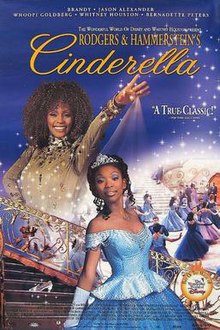| Cinderella | |
|---|---|
 Home video promotional poster, featuring Houston and Brandy as their respective characters. | |
| Also known as | Rodgers & Hammerstein's Cinderella |
| Genre | Musical Fantasy |
| Based on | |
| Written by | Robert L. Freedman |
| Directed by | Robert Iscove |
| Starring | |
| Composer | Richard Rodgers |
| Country of origin | United States |
| Original language | English |
| Production | |
| Executive producers |
|
| Producers | Mike Moder Chris Montan |
| Cinematography | Ralf D. Bode |
| Editors |
|
| Running time | 88 minutes |
| Production companies |
|
| Budget | $12 million |
| Original release | |
| Network | ABC |
| Release | November 2, 1997 |
| Infobox instructions (only shown in preview) | |
Rodgers & Hammerstein's Cinderella (also known as simply Cinderella)[1] is a 1997 American musical fantasy television film produced by Walt Disney Television, directed by Robert Iscove, and written by Robert L. Freedman. Based on the French fairy tale of the same name by Charles Perrault, the film is the second remake and third version of Rodgers and Hammerstein's musical, which originally aired on television in 1957. Adapted from Oscar Hammerstein II's book, Freedman modernized the script to appeal to more contemporary audiences by updating its themes, particularly re-writing its main character into a stronger heroine. Co-produced by Whitney Houston, who also appears as Cinderella's Fairy Godmother, the film stars Brandy in the title role and features a racially diverse ensemble cast consisting of Jason Alexander, Whoopi Goldberg, Bernadette Peters, Veanne Cox, Natalie Desselle, Victor Garber, and Paolo Montalban.
Following the success of the 1993 television adaptation of the stage musical Gypsy (1959), Houston approached Gypsy's producers Craig Zadan and Neil Meron about starring in a remake of Rodgers & Hammerstein's Cinderella for CBS. However, development was delayed for several years, during which time the network grew disinterested in the project. By the time the film was greenlit by Disney for ABC, Houston felt that she had outgrown the title role, which she offered to Brandy instead. The decision to use a color-blind casting approach originated among the producers to reflect how society had evolved by the 1990s, with Brandy becoming the first black actress to portray Cinderella on screen. Among the most significant changes made to the musical, several songs from other Rodgers and Hammerstein productions were interpolated into the film to augment its score. With a production budget of $12 million, Rodgers & Hammerstein's Cinderella ranks among the most expensive television films ever made.
Heavily promoted to re-launch the anthology series The Wonderful World of Disney, Rodgers & Hammerstein's Cinderella premiered on ABC on November 2, 1997, to mixed reviews from critics. While most reviewers praised the film's costumes, sets and supporting cast, particularly Peters, Alexander and Goldberg, television critics were divided over Brandy and Houston's performances, as well as Disney's more feminist approach to Brandy's character. Despite this, Cinderella proved a major ratings success, originally airing to 60 million viewers and establishing itself as the most-watched television musical in decades, earning ABC its highest Sunday-night ratings in 10 years. Rodgers & Hammerstein's Cinderella was nominated for several industry awards, including seven Primetime Emmy Awards, winning one for Outstanding Art Direction for a Variety or Music Program. The program's success inspired Disney and ABC to produce several similar musical projects.
Critical reception towards the film has improved over time, with several media publications ranking it among the best film adaptations of the fairy tale. Rodgers & Hammerstein's Cinderella is regarded by contemporary critics as a groundbreaking film due to the unprecedented diversity of its cast and Brandy's role.
- ^
- Rohwedder, Kristy (October 12, 2017). "'Cinderella' Star Paolo Montalban Proves Exactly Why This Is The Most Superior Cinderella Movie". Bustle.com. Retrieved July 30, 2018.
Rodgers & Hammerstein's Cinderella ... yes, that is the movie's full title.
- "Ellen Mirojnick Biography". Film Reference. Retrieved July 11, 2018.
Rodgers and Hammerstein's Cinderella (also known as Cinderella)
- "Peters, Bernadette 1948–". Encyclopedia.com. Archived from the original on July 16, 2018. Retrieved July 16, 2018.
Cinderella's stepmother, Cinderella (also known as Rodgers & Hammerstein "Cinderella"), ABC, 1997.
- "Rodgers and Hammerstein's Cinderella (1997)". Turner Classic Movies. Retrieved December 22, 2018.
ALSO KNOWN AS: CINDERELLA | WONDERFUL WORLD OF DISNEY (11/02/97), THE
- Rohwedder, Kristy (October 12, 2017). "'Cinderella' Star Paolo Montalban Proves Exactly Why This Is The Most Superior Cinderella Movie". Bustle.com. Retrieved July 30, 2018.